The Amy’s Baking Company PR Disaster (Or, How NOT to Turn the Entire Internet Against You)
The internet’s full of what I like to call “bad car wrecks.”
Awkward moments that would’ve went unnoticed in the pre-online days become objects of digital fascination to satisfy our morbid curiosity.
For the past month or so, the firestorm surrounding Amy’s Baking Company has been my favorite flavor du jour.

“Wise men learn from others’ mistakes.” Well, here’s NOT how to do good PR!
If you aren’t familiar with what went down, here’s the gist of it:
- Sugar daddy invests over $1 million to make his trophy wife’s childhood dream of opening a bakery a reality
- After financial woes, said couple enlists the help of Gordon Ramsey and his show, Kitchen Nightmares, to revitalize their business
- Episode airs, includes scenes of bakery owners berating customers for “not knowing what good food is”, lamenting the “haters” and “food bloggers” who soiled the reputation of their business, and taking tips from their wait staff
- In a Kitchen Nightmares first, Gordon Ramsey walks off the show because the owners refuse to consider even an ounce of constructive criticism
But it didn’t end there…
After the episode aired, keyboard jockeys on some online message boards like 4Chan and Reddit decided to fight back against Amy’s Baking Company with some good, old-fashioned vigilante justice.
They left a swarm of 1 star reviews on Yelp.
Overloaded Amy’s phone and fax machines.
They were relentless with their antics.
“Amy” fired back with profanity-laced tirades on Facebook and Youtube that offer rare glimpses into the mind of a mad woman.
Then, once the backlash reached epic proportions, she doubled down. Said her social media accounts had been “hacked” and she wasn’t responsible… destroying any shred
Ultimately, this PR disaster forced the owners of Amy’s to temporarily close shop and damn near drove them to a mental breakdown (if they weren’t there already).
After a thousand memes were born, Amy’s wised up, hired a PR firm, and planned a “grand re-opening.”
We’ll see how it goes…

Yes…her account was “hacked.” No PR fiasco to worry about here!
I have serious doubts they’ll ever be able to successfully repair their reputation and stay in business.
Is there a lesson in this fiasco? Or is it just an entertaining dose of schadenfreude?
I think there’s both.
Some people in this world are nasty. There’s no avoiding that. And the internet adds a layer of anonymity for people to act up with minimal fear of consequences.
So, how can you avoid becoming the next internet viral sensation?
I think 99% of has to do with checking your ego at the door.
If you decide to start a business, forget about trying to be “right” all the time.
Your taste (no matter how refined), and any expectations of how your customers should respond to what you’re selling are meaningless.
What the customers’ want is the only thing that should concern you. If you don’t give them what they want, they’ll seek out solutions elsewhere. You have to be willing to adapt and change your course, if necessary. Don’t confuse running a business with running a cult. Be willing to change your mind!
And, of course, it helps not to insult your customers’ intelligence along the way.
P.S. If you want me to handle your advertising or marketing for you in a way designed to build long-term relationships with customers based on respect, get in touch and we’ll find out how we can work together.